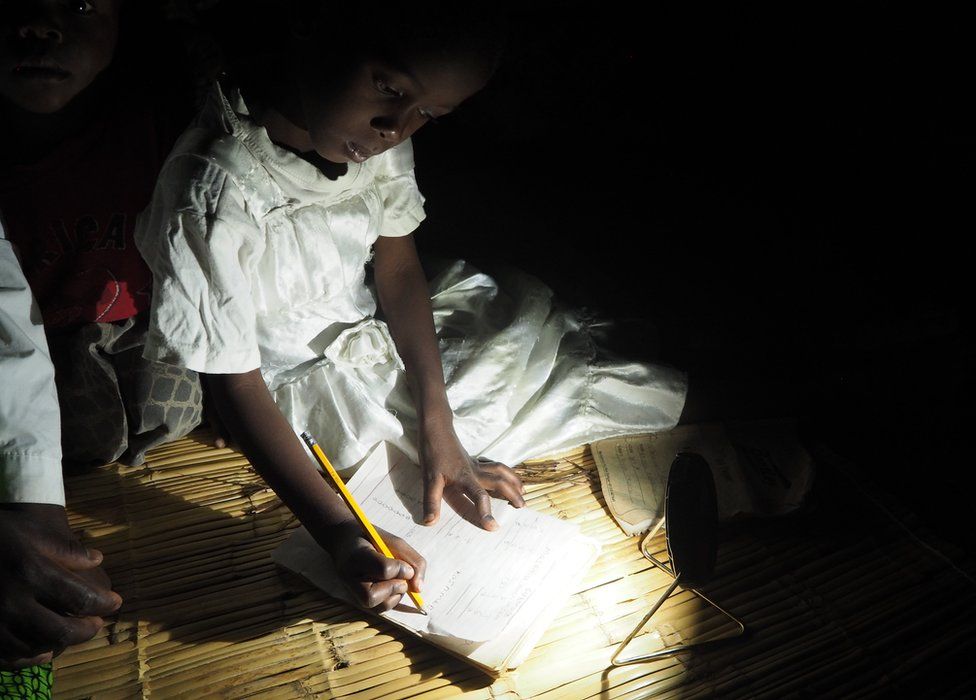COP21: Malawi's battle to hold on to forests
- Published

You’d be pushed to find a more uplifting display of the transformative power of renewable energy.
In a one-room house in rural Malawi, the little face of six-year-old Rachel is framed in a soft white halo.
On a bamboo mat lies a maths book alongside a bundle of fine twigs that she shuffles to help her arithmetic.
The rest of the village is in total darkness but thanks to the lamp - bought with the help of UK government aid - Rachel’s school grades are improving now she can study at home.
In a nearby village, solar panels on a school roof - donated by the Scottish government - have improved results, as well as providing an extra income source from charging phones and car batteries.
“Please thank people in Scotland,” the head teacher asks me. “Thanks to the solar panel we even had one pupil go to national school.”
But these are rare examples of electricity in rural Malawi. This is one of the world’s poorest countries. Just 10% of people are on the grid. And around 90% of power is produced by hydro-electric stations, which are beset by erratic rains caused - Malawian meteorologists say - by climate change.
Malawi’s own greenhouse gas emissions from fossil fuels are minuscule. But the nation has one of the highest deforestation rates in the world as people desperate for fuelwood hack into the once-rich forests.
Deforestation reduces the ability of forests to soak up CO2. It also loosens soil, which then releases carbon dioxide.
Malawi says it will join the battle against climate change, but only if given funding
What’s more, in heavy rains, the loosened soil cascades down the hills. This means aquifers don’t get replenished, rivers burst their banks, and silt and branches clog up the hydropower plants.
Escom, the body that owns the hydro dams, says reservoir capacity has been reduced by two thirds as a result of siltation from forest felling. There are constant black-outs for the few people and businesses who have grid electricity at all.
So what’s Malawi’s answer to its climate and energy crisis?
Well, it is bidding to build two coal-fired power stations. Its politicians realise these will swell the global emissions which are already cranking up temperatures, but they say Malawi needs the power for development. Its emissions up to 2040 are projected to increase by 38%.
Coal, they say, is the least bad option because it offers the opportunity for the country to address deforestation.
Malawi, like most other nations has submitted its pledge on energy and climate (known as an INDC) to the United Nations. It has offered to reforest its hills, expand the use of clean cookstoves and get more solar energy – conditional on help from rich nations as part of the Paris deal.
But no-one should underestimate the scale of Malawi’s challenge. The water catchment above the capital Lilongwe is under such severe assault from wood-cutters that the Army is on stand-by.
The authorities accept that they can’t punish the poor charcoal sellers but their efforts to catch the masterminds of the trade are said to have been bedevilled by corruption.
Part of Malawi’s solution is to have two million efficient cookstoves in operation by 2020. The population is booming and this won’t fulfil national demand.
But each stove, made at low cost of clay by local women, is said to use less than half as much wood as a traditional three-stone open fire.
Another gizmo on trial – a thermoelectric generator developed with Irish aid - can be bolted on to a cookstove to create electricity for charging phones and LED lights. The current is created by the differential in temperature between two metal parts.
This invention will only make a small dent in Malawi's energy needs, though. Lord Stern’s team of international experts on climate economics have concluded that climate change can’t be tackled in countries like Malawi where the population is still 80% rural and where people degrade the land to meet their needs.
The only solution, the team says, is for developing countries to plan densely-packed cities with excellent public transport, powered by renewables – Malawi has an excellent solar resource.
Experts in Malawi say the government, undermined by corruption scandals, is in no state to fulfill that mission.
And the same shortcomings are disbarring the country from attracting large-scale investments in renewables. Paddy Padmanathan, a businessman installing solar thermal power on an epic scale in North Africa, told us Malawi’s development was not sufficiently advanced for that sort of project.
“It's the institutional capacity in many of these countries. There are not enough people who can manage these things in the government structures, who know how to put in place the right policies and procedures and procurement programmes," he said.
Meanwhile despite the campaign against coal by environmentalists in the West, the pressure to burn coal in Malawi is growing.
We visited the Kukoma cooking oil factory which burns huge quantities of wood for its boilers. The owner Mohamed Ameen Nathanie is considering whether to install coal-fired boilers for a more consistent burn.
He asks me: “Do you want me to burn the wood from the countryside – or the coal… you choose!”
Roger Harrabin’s series Changlng Climate concludes on Monday at 8pm and is available on iPlayer. You can watch his film from Malawi on Newsnight tonight. Interviews for the series are available at the OU's www.creativeclimate.org.
Follow Roger on Twitter
- Published23 November 2015
- Published8 February
- Published24 September 2015
- Published16 January 2015